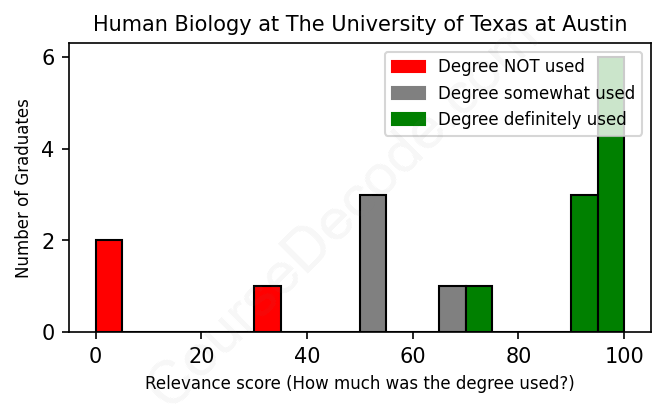
First, some facts. Of the Human Biology graduates from The University of Texas at Austin we've analyzed , here's how many have used (or NOT used) their degree in their career:

These are estimates based on AI analysis of 17 LinkedIn profiles (see below).
The verdict? Slightly above average. Overall, with an average relevance score of 69%, Human Biology graduates from The University of Texas at Austin have a slightly higher likelihood (+2%) of finding work in this field compared to the average graduate across all fields:
And for comparison, here's the chart for all profiles we've looked at across all degrees.
Also, after graduating, 70% of these graduates have pursued further education other than another Bachelor's degree (such as a Masters degree or other), compared to the average across all profiles of 35%. This suggests you may need more than just a Bachelors degree to be competitive as a Human Biology graduate.
See the details:
|
Relevance score: 96% We think this person has gone into a career highly relevant to their degree. We think this person has gone into a career highly relevant to their degree.
DEGREE INFOGraduated in 2017 from The University of Texas at Austin with a Bachelor of Science - BS in Human Biology. Also pursued further education since (see below). JOB HISTORY SINCE GRADUATIONEmergency Medical Technician - Basic In Charge Cypress Creek EMS Jan 2017 - Sep 2017 Customer Service Representative  Fair Deal Insurance Oct 2017 - Jan 2018 Medical Scribe  ScribeAmerica Feb 2018 - Dec 2019 Emergency Medical Technician Basic - Critical Care Team (CCT)  American Medical Response Dec 2019 - May 2020 FURTHER DEGREES DONE SINCE GRADUATINGMaster of Science - MSCase Western Reserve University School of Medicine 2020 - 2022 ABOUTImmersion into the field that you see yourself in -- 2, 4, 10 years down the line - is vital. It is imperative in the development of future professionals & leaders to know the landscape. Work toward contributing to your field rather than just working in it. |
The top 10 most common jobs done by the graduates we've analyzed (ranked most common to least) are:
When analyzing the job titles of individuals who graduated with a degree in Human Biology from the University of Texas at Austin, a few patterns emerge. A significant number of graduates have pursued roles in the healthcare field, such as echocardiographers, emergency medical technicians (EMTs), physician assistants, and medical scribes. These positions directly utilize the knowledge and skills gained during their studies, such as understanding human anatomy, physiology, and medical terminology, making them incredibly relevant to their degree. Additionally, research roles like microbiologists and research assistants at medical institutions also show a strong connection to Human Biology, applying scientific principles in practical settings.
However, there is also a noticeable number of graduates who have taken on positions that are less directly related to their field of study. Roles like front desk receptionists, customer service representatives, and even positions in marketing or administration often rely on general skills rather than specific biological knowledge. This suggests that while a Human Biology degree can open doors in healthcare and research, some graduates may end up in jobs that don’t fully utilize their background. Overall, it's clear that the most common jobs are centered in the health and research sectors, which reflect the relevance of a Human Biology degree, but there is a mixed bag of outcomes for graduates entering various industries.
Here is a visual representation of the most common words in job titles for Human Biology graduates (this is across all Human Biology graduates we've analyzed, not just those who went to The University of Texas at Austin):

Graduates from the Human Biology program at The University of Texas at Austin seem to have quite a diverse career trajectory. It looks like many of them kickstart their careers with jobs that are at least somewhat related to healthcare or research fields right after graduation. For instance, some have landed roles like echocardiographers, medical scribes, and even research assistants at renowned institutions like MD Anderson Cancer Center. On the other hand, there are also a few who started off in unrelated fields such as administrative positions or customer service, which shows that some might feel the need to explore their options before diving into more specialized roles.
Looking further down the road, about 5 to 10 years after graduating, many alumni seem to find themselves in more advanced positions within healthcare, research, or even policy-making roles. For example, you’ve got people becoming Physician Assistants, residents, and even working as senior coordinators at health agencies. However, there are also those who shifted gears into areas like digital marketing or financial services, which may not directly relate to their Human Biology roots. So, while many graduates do find success in health-related careers, others have ventured into very different paths that might or might not align with their initial studies. Overall, it appears that a degree in Human Biology from UT Austin can lead to a solid foundation for various career paths, but the outcomes can vary widely based on individual choices and circumstances.
Honestly, a Bachelor’s degree in Human Biology at UT Austin can be pretty challenging, but it really depends on your background and interests. If you’re into science and have a strong grasp of biology and chemistry, you might find it manageable, but don’t underestimate the workload! You’ll have to tackle a mix of coursework that includes lab work, research, and various advanced classes, which can definitely get intense. It’s about average in terms of difficulty compared to other science degrees, but it can feel tougher if you’re not super passionate about the subject or haven’t done much science before. Just stay organized, keep up with your studies, and you should be all good!
Most commonly, in the LinkedIn profiles we've looked at, it takes people 4 years to finish a Bachelor degree in Human Biology.
Based on the job histories of these Human Biology graduates from UT Austin, it seems like their earnings can really vary. Some, like the graduates who ended up as Physicians Assistants or in high-level positions at places like the UN and USAID, are likely making some solid money, especially considering the field they’re in. Others, starting out in more entry-level roles like a front desk receptionist or working in less specialized positions, might not be raking it in as much, at least early on. Overall, it looks like many in the healthcare and research fields can score decent salaries down the line, especially as they gain experience and move up in their careers. So, while some may start off slow, they could very well be set up for better financial opportunities in the future!
Here is a visual representation of the most common words seen in the "about" section of LinkedIn profiles who have a Bachelor degree in Human Biology (this is across all Human Biology graduates we've analyzed, not just those who went to The University of Texas at Austin). This may or may not be useful:

Here are all colleges offering a Bachelor degree in Human Biology (ordered by the average relevance score of their Human Biology graduates, best to worst) where we have analyzed at least 10 of their graduates:
| College | Score | Count |
|---|---|---|
 Indiana University Bloomington Indiana University Bloomington
|
95 | 10 |
 University of California San Diego University of California San Diego
|
89 | 20 |
 UC San Diego UC San Diego
|
89 | 18 |
 University of California, San Diego University of California, San Diego
|
86 | 16 |
 Stanford University Stanford University
|
84 | 10 |
 University of California, Merced University of California, Merced
|
84 | 16 |
 University of Wisconsin-Green Bay University of Wisconsin-Green Bay
|
79 | 10 |
 North Carolina State University North Carolina State University
|
75 | 31 |
 Michigan State University Michigan State University
|
71 | 48 |
 The University of Texas at Austin The University of Texas at Austin
|
69 | 17 |
 University at Albany, SUNY University at Albany, SUNY
|
69 | 15 |
 Hunter College Hunter College
|
60 | 14 |
 University of Southern California University of Southern California
|
58 | 16 |